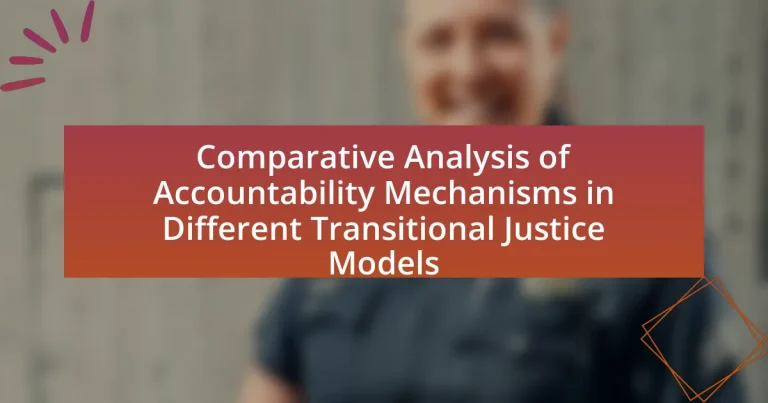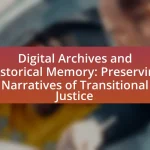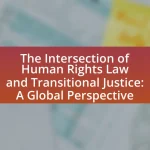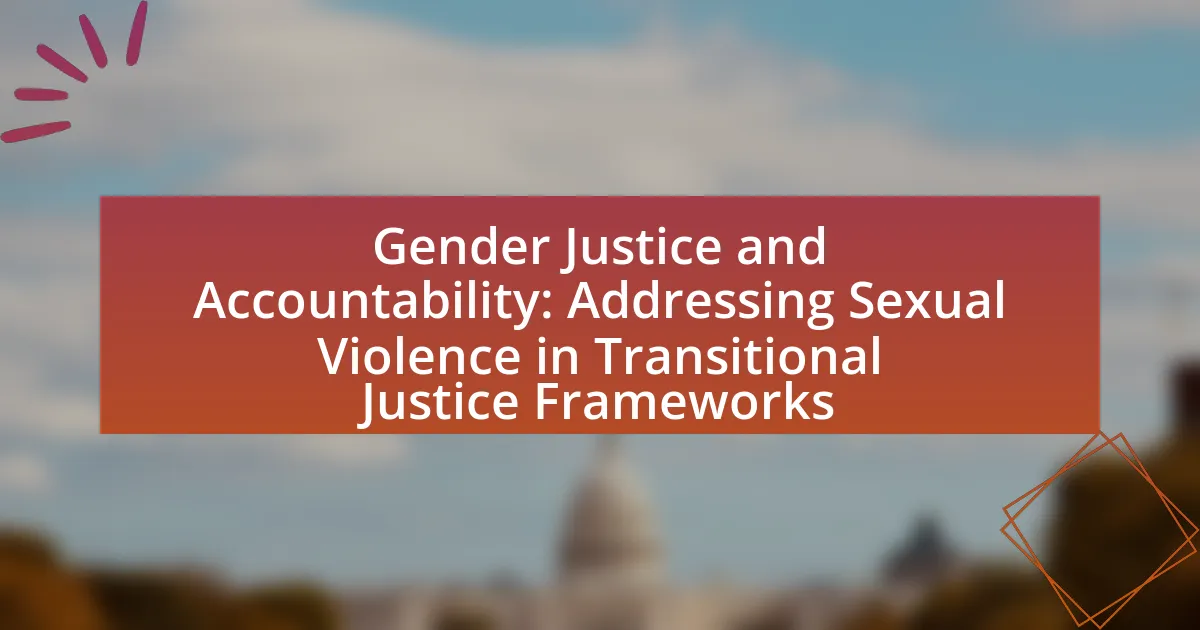The article provides a comparative analysis of accountability mechanisms within various transitional justice models, focusing on processes and institutions that hold perpetrators of human rights violations accountable during periods of conflict or authoritarian rule. It examines different definitions of accountability, key principles such as transparency and redress, and the influence of cultural contexts on these definitions. The article also discusses the importance of accountability in fostering reconciliation, the role of judicial and non-judicial mechanisms, and the impact of reparations on victims’ perceptions of justice. Additionally, it highlights successful examples from countries like South Africa and Rwanda, while addressing the challenges and best practices for enhancing accountability in transitional justice frameworks.
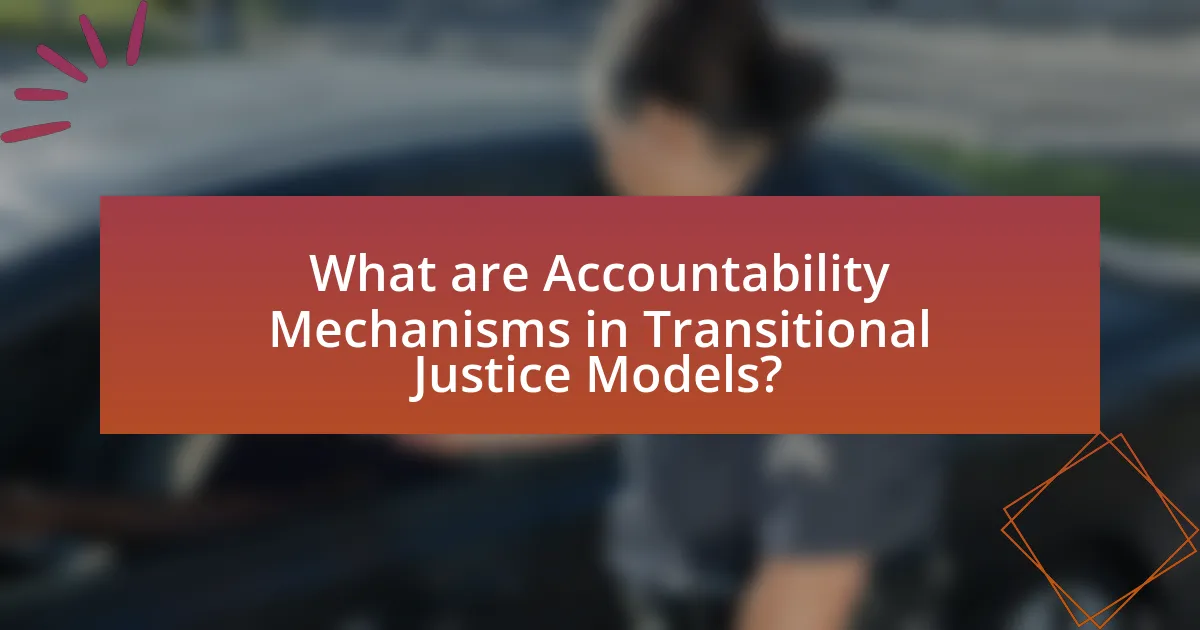
What are Accountability Mechanisms in Transitional Justice Models?
Accountability mechanisms in transitional justice models are processes and institutions designed to hold perpetrators of human rights violations accountable for their actions during periods of conflict or authoritarian rule. These mechanisms can include criminal prosecutions, truth commissions, reparations programs, and institutional reforms aimed at preventing future abuses. For instance, the International Criminal Court (ICC) prosecutes individuals for war crimes and crimes against humanity, while truth commissions, such as South Africa’s Truth and Reconciliation Commission, aim to uncover the truth about past atrocities and promote national healing. These mechanisms are essential for establishing justice, fostering reconciliation, and ensuring that victims’ rights are recognized and upheld.
How do different transitional justice models define accountability?
Different transitional justice models define accountability as the process of holding individuals or institutions responsible for past human rights violations. In retributive justice models, accountability is primarily achieved through legal prosecution and punishment of perpetrators, emphasizing individual criminal responsibility. In contrast, restorative justice models focus on repairing harm through reconciliation and dialogue, prioritizing the needs of victims and community healing over punitive measures. Hybrid models combine elements of both, seeking to balance legal accountability with restorative practices. For instance, the Truth and Reconciliation Commission in South Africa exemplifies a hybrid approach, promoting accountability through truth-telling while offering amnesty to those who fully disclose their involvement in crimes. This multifaceted understanding of accountability reflects the diverse goals and contexts of transitional justice initiatives.
What are the key principles of accountability in these models?
The key principles of accountability in transitional justice models include transparency, responsibility, and redress. Transparency ensures that processes and decisions are open to public scrutiny, fostering trust in the system. Responsibility emphasizes the need for individuals and institutions to be held accountable for their actions, particularly in cases of human rights violations. Redress involves providing victims with appropriate remedies, including restitution, compensation, and rehabilitation. These principles are essential for establishing legitimacy and promoting healing in societies recovering from conflict or authoritarian rule.
How do cultural contexts influence definitions of accountability?
Cultural contexts significantly influence definitions of accountability by shaping societal norms, values, and expectations regarding responsibility and justice. For instance, in collectivist cultures, accountability may emphasize communal responsibility and restoration of relationships, while in individualistic cultures, it often focuses on personal responsibility and punitive measures. Research by the United Nations Development Programme highlights that cultural perceptions of justice can dictate whether accountability mechanisms prioritize reconciliation or retribution, affecting the effectiveness of transitional justice initiatives. This demonstrates that understanding cultural contexts is essential for designing accountability frameworks that resonate with local populations and promote sustainable peace.
Why is accountability important in transitional justice?
Accountability is crucial in transitional justice because it ensures that perpetrators of human rights violations are held responsible for their actions, which fosters trust in the justice system and promotes societal healing. By addressing past injustices, accountability mechanisms, such as trials and truth commissions, provide victims with recognition and validation of their suffering. Historical evidence shows that societies that prioritize accountability, like South Africa post-apartheid, experience greater stability and reconciliation, as accountability helps to deter future violations and reinforces the rule of law.
What role does accountability play in reconciliation processes?
Accountability is crucial in reconciliation processes as it fosters trust and legitimacy among affected communities. By holding perpetrators accountable for their actions, societies can acknowledge past injustices, which is essential for healing and rebuilding relationships. For instance, the Truth and Reconciliation Commission in South Africa demonstrated that accountability mechanisms, such as public testimonies and legal repercussions, contributed to national healing by validating victims’ experiences and promoting a collective understanding of historical wrongs. This process not only addresses grievances but also deters future violations, thereby reinforcing the rule of law and societal norms.
How does accountability affect victims’ perceptions of justice?
Accountability significantly enhances victims’ perceptions of justice by fostering a sense of validation and closure. When perpetrators are held accountable for their actions, victims often feel that their suffering is acknowledged and that justice is being served. Research indicates that accountability mechanisms, such as trials or truth commissions, can lead to increased satisfaction among victims, as they perceive these processes as a means of restoring their dignity and ensuring that similar violations do not occur in the future. For instance, a study published in the Journal of Peace Research found that victims who witnessed accountability measures reported higher levels of trust in institutions and a greater belief in the rule of law, reinforcing the notion that accountability is crucial for victims’ overall sense of justice.
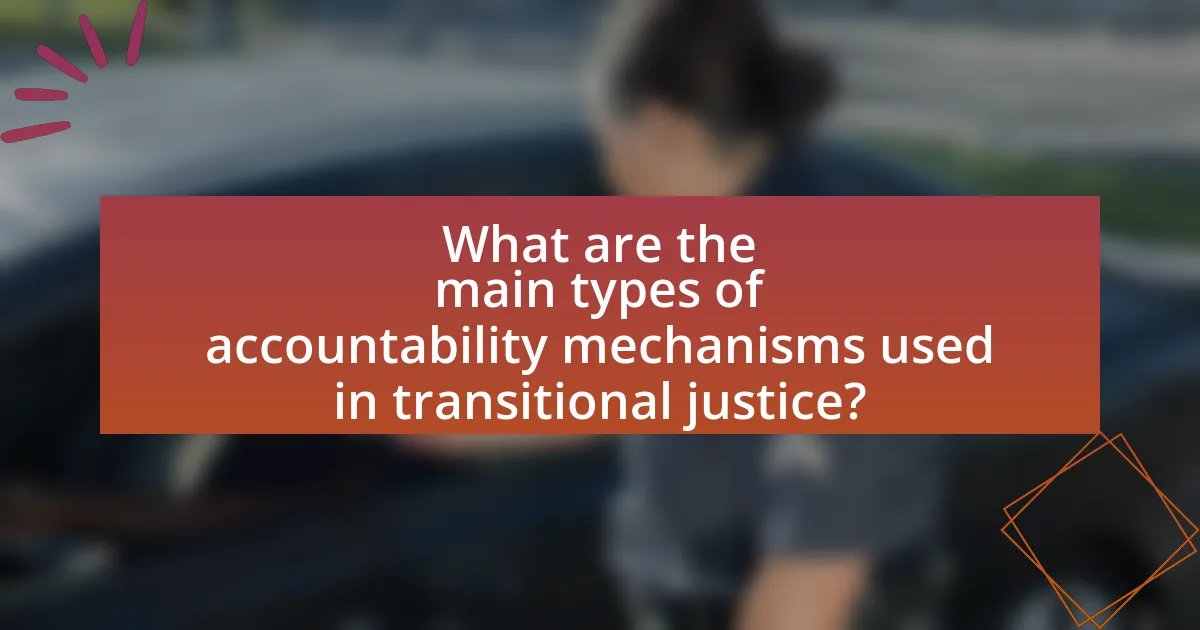
What are the main types of accountability mechanisms used in transitional justice?
The main types of accountability mechanisms used in transitional justice include criminal prosecutions, truth commissions, reparations programs, and institutional reforms. Criminal prosecutions hold individuals accountable for human rights violations through legal proceedings, exemplified by the International Criminal Court’s trials for war crimes. Truth commissions, such as South Africa’s Truth and Reconciliation Commission, aim to uncover the truth about past atrocities and promote healing. Reparations programs provide compensation to victims, as seen in various countries that have implemented financial or symbolic reparations. Institutional reforms focus on restructuring governmental and judicial systems to prevent future abuses, often involving police and military reforms. Each mechanism serves to address past injustices and promote accountability in post-conflict societies.
What are the differences between judicial and non-judicial mechanisms?
Judicial mechanisms involve formal legal processes, such as courts, where disputes are resolved according to established laws and procedures, while non-judicial mechanisms include informal or alternative methods, such as mediation or community-based approaches, that do not rely on the formal legal system. Judicial mechanisms typically provide binding decisions and are governed by legal standards, ensuring accountability through due process, whereas non-judicial mechanisms often emphasize restorative justice, community involvement, and flexibility, allowing for tailored resolutions that may not adhere strictly to legal norms. The effectiveness of these mechanisms can vary based on context, with judicial mechanisms often seen as more authoritative but potentially slower, while non-judicial mechanisms can be quicker and more culturally relevant but may lack enforceability.
How do trials contribute to accountability in transitional justice?
Trials contribute to accountability in transitional justice by providing a formal mechanism to hold perpetrators of human rights violations accountable for their actions. This process not only seeks to deliver justice for victims but also aims to establish a historical record of abuses, thereby promoting truth and reconciliation. For instance, the International Criminal Tribunal for the former Yugoslavia (ICTY) successfully prosecuted individuals for war crimes, which reinforced the principle that individuals, including state leaders, can be held accountable under international law. Such trials serve to deter future violations by signaling that impunity will not be tolerated, thus fostering a culture of accountability within societies transitioning from conflict or authoritarian rule.
What is the role of truth commissions in promoting accountability?
Truth commissions play a crucial role in promoting accountability by investigating and documenting human rights violations, thereby establishing a historical record of abuses. These commissions facilitate public acknowledgment of past atrocities, which is essential for societal healing and reconciliation. For instance, the South African Truth and Reconciliation Commission, established in 1995, revealed extensive human rights violations during apartheid, leading to greater public awareness and accountability for perpetrators. By providing a platform for victims to share their experiences, truth commissions not only validate their suffering but also encourage legal and political reforms aimed at preventing future violations. This process of truth-telling and acknowledgment is vital for fostering a culture of accountability within societies transitioning from conflict or authoritarian rule.
How do reparations fit into accountability mechanisms?
Reparations are integral to accountability mechanisms as they provide a tangible acknowledgment of harm and a means of redress for victims. In transitional justice models, reparations serve to restore dignity and support healing by compensating individuals or communities affected by past injustices, such as human rights violations. For instance, the Truth and Reconciliation Commission in South Africa included reparations as a key component to address the injustices of apartheid, highlighting the importance of financial compensation and public acknowledgment in fostering societal healing. This demonstrates that reparations not only hold perpetrators accountable but also empower victims, reinforcing the overall effectiveness of accountability mechanisms in transitional justice.
What types of reparations are commonly implemented?
Commonly implemented types of reparations include financial compensation, restitution of property, rehabilitation services, and symbolic measures such as public apologies. Financial compensation provides direct monetary payments to victims, while restitution involves returning property or assets taken during conflicts. Rehabilitation services focus on medical and psychological support for victims, addressing their needs for recovery. Symbolic measures, such as public acknowledgments of wrongdoing, serve to validate victims’ experiences and promote societal healing. These reparations aim to restore dignity and provide justice to those affected by past injustices, as seen in various transitional justice frameworks worldwide.
How do reparations impact the accountability landscape?
Reparations significantly enhance the accountability landscape by providing a mechanism for acknowledging and addressing historical injustices. They serve as a formal recognition of harm inflicted on individuals or communities, which can lead to greater public awareness and discourse surrounding accountability. For instance, in South Africa, the Truth and Reconciliation Commission’s reparations program aimed to compensate victims of apartheid, thereby fostering a culture of accountability and encouraging societal healing. This approach not only holds perpetrators accountable but also empowers victims, reinforcing the notion that justice includes both acknowledgment of wrongs and tangible restitution.
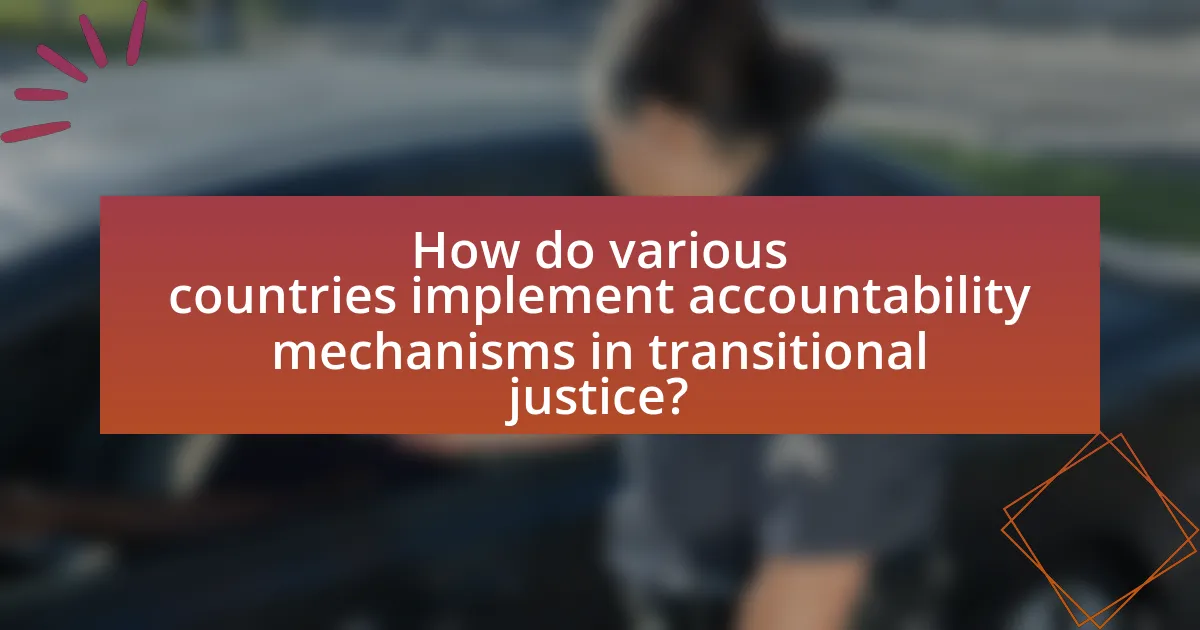
How do various countries implement accountability mechanisms in transitional justice?
Various countries implement accountability mechanisms in transitional justice through a combination of legal frameworks, truth commissions, and reparations programs. For instance, South Africa established the Truth and Reconciliation Commission (TRC) to address human rights violations during apartheid, allowing victims to share their experiences while granting amnesty to perpetrators who fully disclosed their actions. Similarly, Argentina’s National Commission on the Disappearance of Persons (CONADEP) documented human rights abuses during the military dictatorship, leading to legal actions against perpetrators. In Rwanda, the Gacaca courts were created to handle cases related to the 1994 genocide, emphasizing community involvement in justice processes. These mechanisms demonstrate how different nations tailor their approaches to accountability based on historical contexts and societal needs, reinforcing the importance of local engagement in transitional justice efforts.
What are some successful examples of accountability in transitional justice?
Successful examples of accountability in transitional justice include the Truth and Reconciliation Commission (TRC) in South Africa and the International Criminal Tribunal for the former Yugoslavia (ICTY). The TRC, established in 1995, facilitated a process where victims and perpetrators could share their experiences, leading to public acknowledgment of human rights violations and fostering national healing. The ICTY, established in 1993, prosecuted key figures for war crimes, contributing to international legal precedents and reinforcing the principle that individuals can be held accountable for crimes against humanity. Both mechanisms demonstrate effective accountability by promoting justice and reconciliation in post-conflict societies.
How did South Africa’s Truth and Reconciliation Commission address accountability?
South Africa’s Truth and Reconciliation Commission (TRC) addressed accountability by establishing a framework for truth-telling and reparations while promoting restorative justice. The TRC facilitated public hearings where victims and perpetrators could share their experiences, which helped to document human rights violations during apartheid. This process encouraged accountability by exposing the actions of individuals and institutions involved in these violations, as evidenced by the TRC’s final report, which identified over 20,000 human rights violations and named specific perpetrators. Additionally, the TRC offered amnesty to those who fully disclosed their involvement in political crimes, thereby incentivizing accountability through transparency.
What lessons can be learned from the accountability mechanisms in Rwanda?
The accountability mechanisms in Rwanda demonstrate the importance of integrating local community involvement in transitional justice processes. These mechanisms, particularly the Gacaca courts, facilitated grassroots participation, allowing communities to address grievances and promote reconciliation. The Gacaca system processed over 1.9 million cases related to the 1994 genocide, highlighting the effectiveness of community-based approaches in achieving accountability and fostering social cohesion. Additionally, Rwanda’s emphasis on national unity and the establishment of a legal framework for accountability, including the International Criminal Tribunal for Rwanda, underscores the necessity of a multi-faceted approach that combines local and international efforts to ensure justice and prevent future atrocities.
What challenges do countries face in establishing effective accountability mechanisms?
Countries face significant challenges in establishing effective accountability mechanisms, primarily due to political resistance, lack of resources, and societal divisions. Political resistance often stems from those in power who may fear repercussions for past actions, leading to a lack of political will to implement accountability measures. Additionally, many countries struggle with insufficient financial and human resources, which hampers the development and enforcement of these mechanisms. Societal divisions, often exacerbated by historical grievances, can further complicate the establishment of a unified approach to accountability, as different groups may have conflicting views on justice and reconciliation. These challenges are evident in various transitional justice contexts, where the absence of robust accountability frameworks has led to ongoing impunity and unresolved conflicts.
How do political will and public support influence accountability efforts?
Political will and public support are critical factors that significantly influence accountability efforts in transitional justice models. Political will, defined as the commitment of political leaders to prioritize accountability, directly impacts the implementation of justice mechanisms. For instance, in countries like South Africa, the political will demonstrated by leaders during the Truth and Reconciliation Commission facilitated a robust accountability process, allowing for public testimonies and reparations.
Public support, on the other hand, creates a societal demand for accountability, pressuring governments to act. In the case of Argentina, widespread public support for accountability after the military dictatorship led to the prosecution of human rights violators, showcasing how collective societal action can drive political decisions. Together, strong political will and active public support create an environment conducive to effective accountability efforts, as evidenced by historical transitions in various countries.
What obstacles do transitional justice processes encounter in post-conflict societies?
Transitional justice processes in post-conflict societies encounter several significant obstacles, including political instability, lack of resources, and societal divisions. Political instability often undermines the establishment of effective legal frameworks and institutions necessary for justice, as seen in countries like Libya, where ongoing conflict hampers accountability efforts. Additionally, limited financial and human resources restrict the capacity to implement transitional justice mechanisms, as evidenced in the case of Sierra Leone, where insufficient funding affected the Truth and Reconciliation Commission’s operations. Societal divisions, stemming from ethnic or political tensions, can also impede reconciliation efforts, exemplified by the challenges faced in Rwanda post-genocide, where deep-seated mistrust complicates the pursuit of justice. These factors collectively hinder the effectiveness of transitional justice initiatives in achieving accountability and fostering societal healing.
What best practices can enhance accountability in transitional justice models?
Best practices that can enhance accountability in transitional justice models include establishing clear legal frameworks, ensuring victim participation, and promoting transparency in processes. Clear legal frameworks provide a solid foundation for accountability by defining the scope of justice mechanisms and the responsibilities of actors involved. Victim participation is crucial as it empowers affected communities, ensuring their voices are heard and their needs addressed, which fosters trust in the justice process. Transparency in processes, such as public hearings and accessible documentation, helps to build public confidence and deter corruption, as evidenced by successful models in countries like South Africa and Rwanda, where these practices contributed to greater accountability and societal healing.
How can stakeholder engagement improve accountability outcomes?
Stakeholder engagement can improve accountability outcomes by fostering transparency and trust among involved parties. When stakeholders, including victims, communities, and organizations, actively participate in the accountability process, they contribute diverse perspectives and insights that enhance the legitimacy of the mechanisms in place. Research indicates that inclusive engagement leads to higher compliance rates and better implementation of accountability measures, as stakeholders feel a sense of ownership and responsibility towards the outcomes. For instance, the United Nations has highlighted that participatory approaches in transitional justice initiatives, such as truth commissions, result in more effective accountability by ensuring that the voices of affected populations are heard and considered in decision-making processes.
What role does international support play in strengthening accountability mechanisms?
International support plays a crucial role in strengthening accountability mechanisms by providing resources, expertise, and legitimacy to local efforts. This support can enhance the capacity of institutions responsible for accountability, such as courts and truth commissions, by offering technical assistance, funding, and training. For instance, the International Criminal Court’s involvement in various countries has helped establish legal frameworks and promote adherence to international human rights standards, thereby reinforcing local accountability processes. Additionally, international support can foster political will by applying pressure on governments to uphold accountability measures, as seen in cases where foreign aid is contingent upon human rights improvements.
